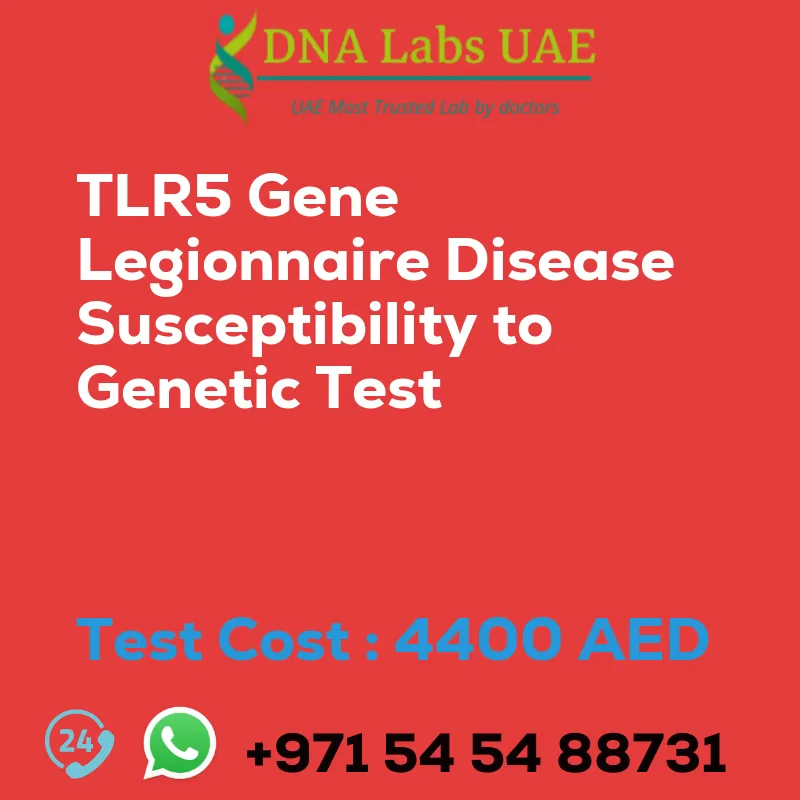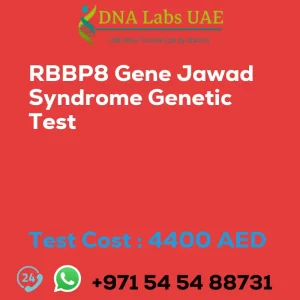TLR5 Gene Legionnaire Disease Susceptibility to Genetic Test
Genetic testing plays a crucial role in assessing an individual’s susceptibility to Legionnaire disease. One such test is the TLR5 Gene Legionnaire Disease Susceptibility Genetic Test offered by DNA Labs UAE. This blog will provide detailed information about the test, including its components, price, sample condition, report delivery, method, test type, doctor, test department, and pre-test information.
Test Name: TLR5 Gene Legionnaire Disease Susceptibility to Genetic Test
Components:
- Price: 4400.0 AED
- Sample Condition: Blood or Extracted DNA or One drop Blood on FTA Card
- Report Delivery: 3 to 4 Weeks
- Method: NGS Technology
- Test Type: Dysmorphology
- Doctor: Pediatrics
- Test Department: Genetics
Pre Test Information:
Prior to undergoing the TLR5 Gene Legionnaire Disease Susceptibility Genetic Test, it is important to provide the clinical history of the patient. Additionally, a genetic counseling session may be conducted to draw a pedigree chart of family members affected by TLR5 Gene Legionnaire Disease. This information will help in the interpretation of the test results.
Test Details:
The TLR5 gene is responsible for encoding a protein called Toll-like receptor 5, which plays a crucial role in the immune system’s response to bacterial infections. Mutations in the TLR5 gene have been associated with an increased susceptibility to Legionnaire disease, a severe form of pneumonia caused by the Legionella bacteria.
NGS genetic tests, such as the TLR5 Gene Legionnaire Disease Susceptibility Genetic Test, analyze an individual’s DNA to identify mutations or variations in specific genes, including the TLR5 gene. By detecting TLR5 gene mutations, these tests can help determine a person’s susceptibility to Legionnaire disease.
If someone undergoes the TLR5 Gene Legionnaire Disease Susceptibility Genetic Test and is found to have TLR5 gene mutations, it suggests that they may have an increased risk of developing Legionnaire disease. This information can be valuable for healthcare providers in assessing a person’s risk and potentially implementing preventive measures or targeted treatments to reduce the likelihood of infection.
It is important to note that genetic testing is just one factor in determining an individual’s susceptibility to Legionnaire disease. Other factors, such as overall health status and exposure to the Legionella bacteria, also play a significant role. Therefore, genetic testing results should be interpreted in conjunction with other clinical and environmental information to provide a comprehensive assessment of an individual’s risk.
| Test Name | TLR5 Gene Legionnaire disease susceptibility to Genetic Test |
|---|---|
| Components | |
| Price | 4400.0 AED |
| Sample Condition | Blood or Extracted DNA or One drop Blood on FTA Card |
| Report Delivery | 3 to 4 Weeks |
| Method | NGS Technology |
| Test type | Dysmorphology |
| Doctor | Pediatrics |
| Test Department: | Genetics |
| Pre Test Information | Clinical History of Patient who is going for TLR5 Gene Legionnaire disease, susceptibility to NGS Genetic DNA Test. A Genetic Counselling session to draw a pedigree chart of family members affected with TLR5 Gene Legionnaire disease, susceptibility to NGS Genetic DNA Test gene TLR5 |
| Test Details |
The TLR5 gene is responsible for encoding a protein called Toll-like receptor 5, which plays a crucial role in the immune system’s response to bacterial infections. Mutations in the TLR5 gene have been associated with an increased susceptibility to Legionnaire disease. Legionnaire disease is a severe form of pneumonia caused by the Legionella bacteria. People with compromised immune systems or specific genetic variations, such as TLR5 gene mutations, may be more susceptible to this infection. Next-generation sequencing (NGS) genetic tests can analyze an individual’s DNA to identify mutations or variations in specific genes, including the TLR5 gene. By detecting TLR5 gene mutations, NGS tests can help determine a person’s susceptibility to Legionnaire disease. If someone undergoes an NGS genetic test and is found to have TLR5 gene mutations, it suggests that they may have an increased risk of developing Legionnaire disease. This information can be valuable for healthcare providers in assessing a person’s risk and potentially implementing preventive measures or targeted treatments to reduce the likelihood of infection. It is important to note that genetic testing is just one factor in determining an individual’s susceptibility to Legionnaire disease. Other factors, such as overall health status and exposure to the Legionella bacteria, also play a significant role. Therefore, genetic testing results should be interpreted in conjunction with other clinical and environmental information to provide a comprehensive assessment of an individual’s risk. |








